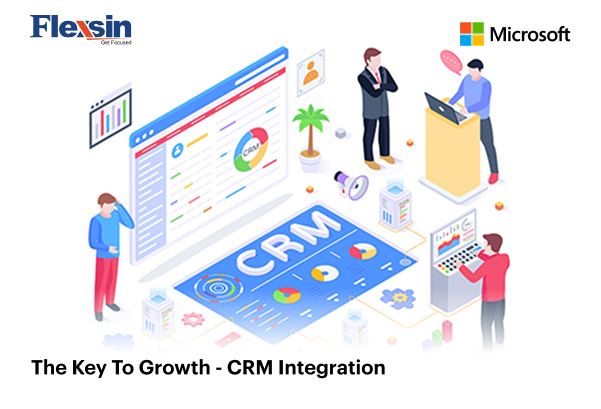In the modern business environment, efficiency and innovation are no longer optional—they are essential for staying ahead of the competition. For businesses looking to manage customer relationships more effectively and streamline their operations, Microsoft CRM integration solutions provide the key to success. But how do you unlock the full potential of these solutions? Let’s dive into the power of Microsoft CRM integration and explore how it can help enhance business productivity and improve customer relationships.
The Power of Microsoft CRM Integration
1. Key Features and Benefits
When we talk about Microsoft CRM integration solutions, we’re referring to a suite of powerful tools designed to streamline your business operations. These tools allow businesses to connect disparate systems, ensuring that information flows seamlessly across departments. Microsoft CRM is a robust platform that facilitates everything from marketing automation and customer service management to sales tracking and performance analytics.
2. Enhancing Operational Efficiency
One of the most significant benefits of Microsoft CRM integration is the increased operational efficiency it offers. By integrating all your business functions—sales, marketing, customer service, and more—into a unified platform, you can eliminate the need for multiple disconnected systems. This reduces manual data entry, minimizes human error, and speeds up workflows, allowing your teams to focus on what matters most: driving results.
3. Improving Customer Relationship Management (CRM)
Microsoft CRM isn’t just about automating processes. It’s about empowering your business to build deeper, more meaningful relationships with your customers. With Microsoft CRM system integration, you can provide personalized customer experiences that are tailored to each individual’s needs. From tracking customer interactions to providing timely support, CRM integration enables businesses to nurture stronger relationships and boost customer satisfaction.

Types of Microsoft CRM Integration Solutions
1. Microsoft CRM API Integration
Microsoft CRM API integration is a powerful way to connect your CRM system with other essential business applications. By utilizing APIs, businesses can automate data transfer between different software solutions, ensuring that your customer information is always up to date. This integration type makes it easier for businesses to scale their operations while maintaining consistency across all platforms.
2. Microsoft CRM eCommerce Integration
For businesses running eCommerce platforms, Microsoft CRM eCommerce integration is an essential solution. It bridges the gap between your online store and your CRM system, allowing you to gather detailed insights about customer behavior, preferences, and buying patterns. By integrating CRM with eCommerce, businesses can better manage inventory, streamline order processing, and deliver personalized marketing messages that resonate with their audience.
3. System Integration for Streamlined Business Processes
Microsoft CRM integration also extends beyond APIs and eCommerce. Microsoft CRM system integration ensures that all your systems, from HR to finance to supply chain, work together seamlessly. This type of integration improves collaboration across departments and provides real-time visibility into business performance, helping teams make better, data-driven decisions.
Key Benefits of Microsoft CRM Integration
1. Streamlining Data Management and Processes
Effective data management is at the heart of every successful business. By integrating Microsoft CRM solutions, you can streamline your data management processes, making it easier to store, retrieve, and analyze customer information. With all your data centralized in one place, your team can access it in real-time, ensuring they always have the insights they need to make informed decisions.
2. Enhanced Data-Driven Decision Making
With Microsoft CRM integration solutions, businesses can make better decisions by leveraging the power of data. By connecting all systems, businesses can gain a 360-degree view of their customer, sales, and operations data. This data-driven approach helps businesses optimize processes, improve customer engagement, and enhance performance across all areas of the organization.
3. Seamless Collaboration Across Teams
The more departments and teams collaborate, the more efficient your business becomes. Microsoft CRM integration solutions enhance collaboration by providing a unified platform where teams can share information and insights. From sales teams to customer service reps, everyone has access to the same data, which leads to faster decision-making, improved service quality, and more coordinated efforts.
Microsoft CRM Integration for Different Business Needs
1. Tailored Solutions for Small Businesses
Small businesses often face challenges when it comes to managing customer relationships and scaling their operations. Microsoft CRM system integration offers small businesses an affordable and efficient way to streamline operations, enhance productivity, and scale with ease. With customizable CRM solutions, small businesses can implement solutions that fit their unique needs and goals.
2. Enterprise-Level CRM Integration
Large enterprises with complex needs benefit from the flexibility and scalability that Microsoft CRM integration solutions offer. These solutions can be customized to meet the unique requirements of large organizations, enabling them to handle high volumes of customer data, optimize workflows, and manage operations across multiple departments, regions, and markets.
3. Customer-Centric Approach to Integration
Whether you’re a small business or an enterprise, Salesforce Agentforce integration or Microsoft CRM eCommerce integration solutions can be customized to focus on delivering exceptional customer experiences. From personalized marketing campaigns to targeted customer service strategies, CRM integration helps you stay connected to your customers at every touchpoint.
Steps to Implement Microsoft CRM Integration
1. Understanding Your CRM Requirements
Before you dive into CRM integration, it’s essential to understand your specific requirements. Whether you need a CRM for sales automation, customer service management, or marketing automation, Microsoft CRM API integration can be customized to fit your needs. We recommend working with a team of experts to assess your requirements and map out a clear integration strategy.
2. Choosing the Right Integration Services
The next step is to choose the right Microsoft CRM integration services. You’ll want to partner with a provider that offers expertise in both CRM solutions and system integration. At Flexsin, we offer Microsoft CRM implementation services tailored to your business needs. Our team will work with you to ensure smooth integration and maximum ROI.
3. Ongoing Support and Maintenance
CRM integration doesn’t stop once the system is up and running. To ensure your system continues to meet your needs, ongoing support and maintenance are crucial. We provide comprehensive support services to help you maintain your Microsoft CRM system, ensuring that it evolves with your business and continues to deliver value over time.
Challenges in CRM Integration
1. Overcoming Common Obstacles
While Microsoft CRM integration offers immense benefits, it’s not without its challenges. Some of the common hurdles businesses face include data migration issues, lack of technical expertise, and resistance to change from employees. However, with the right planning and expert guidance, these challenges can be overcome.
2. Managing Data Migration and Syncing Issues
Data migration is one of the most critical components of CRM integration. Ensuring that your existing data is accurately transferred to the new system is essential for a smooth transition. Microsoft CRM API integration and Microsoft CRM system integration can streamline this process, ensuring that your data remains consistent across platforms.
The Future of Microsoft CRM Integration Solutions
As we look ahead, Microsoft CRM integration will continue to evolve, offering new features, capabilities, and opportunities for businesses of all sizes. Whether you’re a small business or a large enterprise, integrating Microsoft CRM into your operations will help you deliver better customer experiences, optimize business processes, and stay ahead of the competition.
By leveraging the power of Microsoft CRM integration solutions, businesses can ensure that their operations are both efficient and scalable. As the digital landscape continues to evolve, Microsoft CRM will remain a cornerstone for businesses seeking to enhance customer relationships and drive growth. To learn more about Salesforce integration solutions, visit Flexsin and explore our range of tailored integration services that can help you reach your goals.


 Sudhir K Srivastava
Sudhir K Srivastava